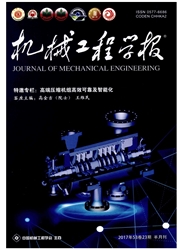

 中文摘要:
中文摘要:
In recent years, the correlation coefficient of pressure data from the same blade passage in an axial compressor unit has been used to characterize the state of flow in the blade passage. In addition, the correlation coefficient has been successfully used as an indicator for active control action using air injection. In this work, the correlation coefficient approach is extended to incorporate system identification algorithms in order to extract a mathematical model of the dynamics of the flows within a blade passage. The dynamics analyzed in this research focus on the flow streams and pressure along the rotor blades as well as on the unsteady tip leakage flow from the rotor tip gaps. The system identification results are used to construct a root locus plot for different flow coefficients, starting far away from stall to near stall conditions. As the compressor moves closer to stall, the poles of the identified models move towards the imaginary axis of the complex plane, indicating an impending instability. System frequency data is captured using the proposed correlation based system identification approach. Additionally, an oscillatory tip leakage flow is observed at a flow coefficient away from stall and how this oscillation changes as the compressor approaches stall is an interesting result of this research. Comparative research is analyzed to determine why the oscillatory flow behavior occurs at a specific sensor location within the tip region of the rotor blade.
 英文摘要:
英文摘要:
In recent years, the correlation coefficient of pressure data from the same blade passage in an axial compressor unit has been used to characterize the state of flow in the blade passage. In addition, the correlation coefficient has been successfully used as an indicator for active control action using air injection. In this work, the correlation coefficient approach is extended to incorporate system identification algorithms in order to extract a mathematical model of the dynamics of the flows within a blade passage. The dynamics analyzed in this research focus on the flow streams and pressure along the rotor blades as well as on the unsteady tip leakage flow from the rotor tip gaps. The system identification results are used to construct a root locus plot for different flow coefficients, starting far away from stall to near stall conditions. As the compressor moves closer to stall, the poles of the identified models move towards the imaginary axis of the complex plane, indicating an impending instability. System frequency data is captured using the proposed correlation based system identification approach. Additionally, an oscillatory tip leakage flow is observed at a flow coefficient away from stall and how this oscillation changes as the compressor approaches stall is an interesting result of this research. Comparative research is analyzed to determine why the oscillatory flow behavior occurs at a specific sensor location within the tip region of the rotor blade.
 同期刊论文项目
同期刊论文项目
 同项目期刊论文
同项目期刊论文
 期刊信息
期刊信息
